Key takeaways:
- Open-source solutions foster collaboration and empower users to contribute and customize tools, enhancing innovation.
- Effective communication frameworks are crucial for successful open-source projects, promoting transparency, trust, and team cohesion.
- Engaging with open-source communities provides valuable support and learning opportunities, transforming challenges into collective problem-solving experiences.
- Future advancements in open-source communication may include AI integration for enhanced user engagement and improved data privacy solutions.
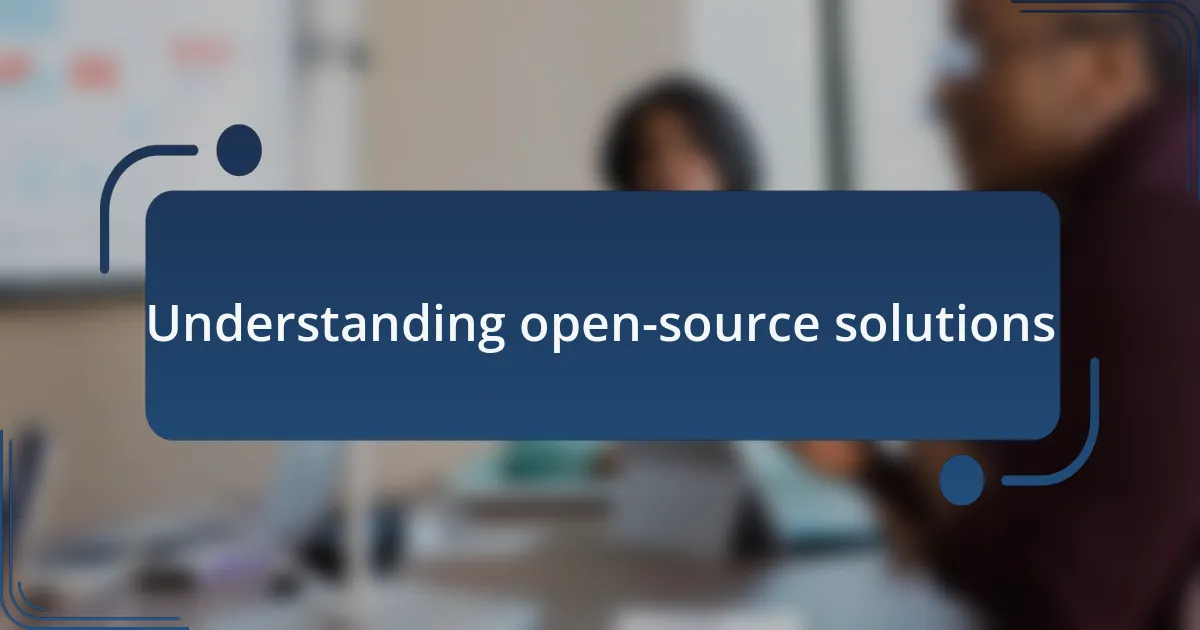
Understanding open-source solutions
Open-source solutions are fascinating because they embody the principles of collaboration and transparency. When I first delved into them, I was amazed to see how community-driven projects could evolve so rapidly. Have you ever thought about how much collective knowledge can be harnessed when people come together for a common goal?
I remember my first experience using an open-source tool; it felt like stepping into a vibrant workshop filled with creative minds. I faced challenges initially, but finding solutions within forums and documentation built a sense of camaraderie. It was empowering to realize that not only was I benefiting from the work of others, but I was also able to contribute back, sharing my own insights.
Open-source not only democratizes access to resources but also nurtures innovation. It’s incredible to see how people from diverse backgrounds can collaborate to create software that anyone can modify. Have you ever considered the potential of joining such a community? The thrill of collaboration and learning from one another can be truly life-changing.
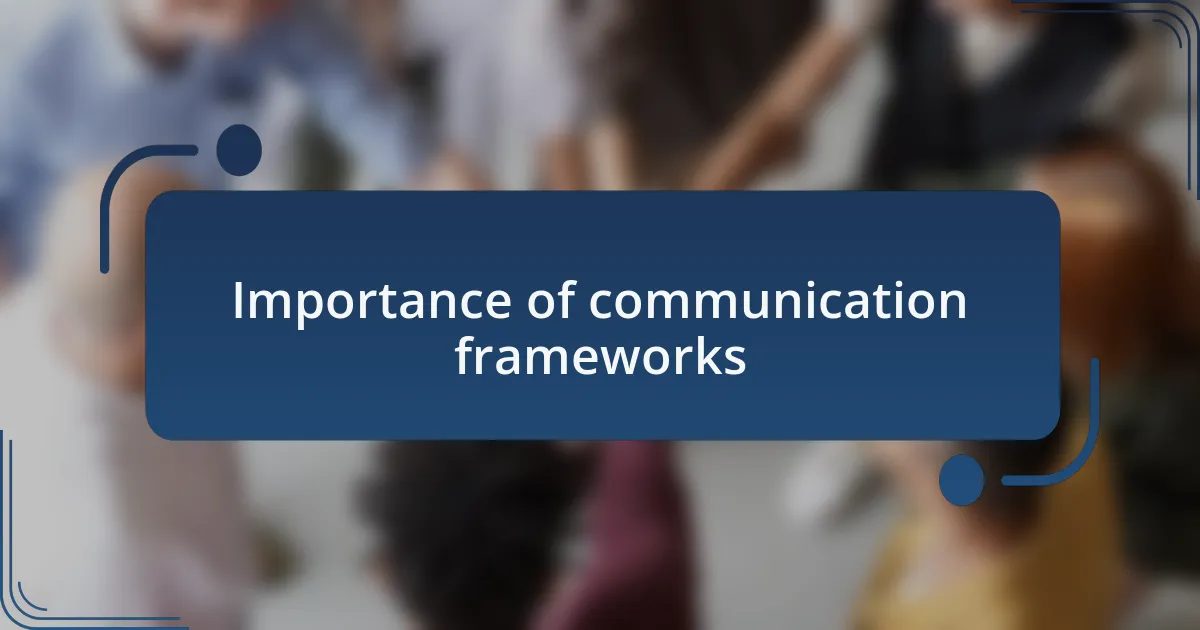
Importance of communication frameworks
Effective communication frameworks are vital in any collaborative environment, especially when working on open-source projects. I remember a moment when a poorly defined structure nearly derailed a project I was involved in. It made me realize how crucial it is to have clear channels and guidelines in place to ensure everyone is on the same page.
Through my experiences, I’ve witnessed how well-established communication frameworks can transform chaotic discussions into productive conversations. For instance, when contributors have access to organized forums and documentation, it fosters a sense of belonging and encourages participation. Have you ever tried to navigate a project without clear communication? It can feel overwhelming and isolating.
Moreover, a strong communication framework promotes transparency and trust among team members. In one of my projects, we implemented regular check-ins to discuss progress openly. The result was a more cohesive team and a shared commitment to our goals. Reflecting on this, I think about how essential these frameworks are in nurturing a sense of community and driving collective success.
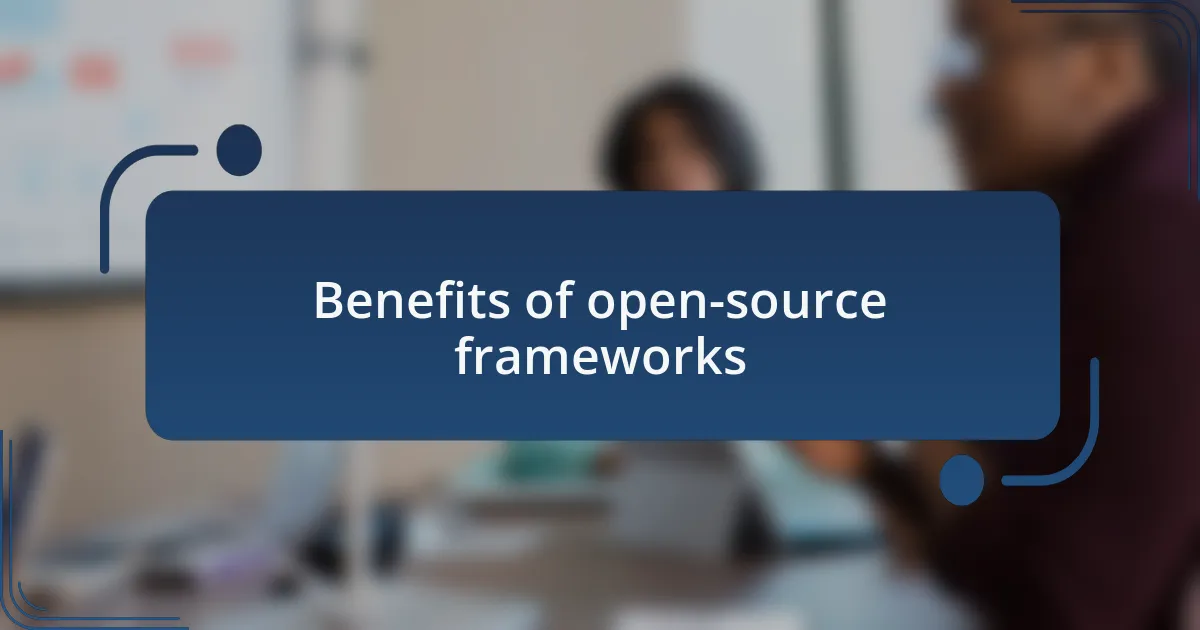
Benefits of open-source frameworks
The flexibility of open-source frameworks is one of their most enticing benefits. I remember a project where we could easily customize the framework to fit our unique needs, which felt empowering. Have you ever felt restricted by proprietary tools? The ability to mold a solution to match what we envisioned was a game-changer, allowing our project to develop organically based on our team’s input.
Another significant advantage is the vibrant community often surrounding open-source solutions. I once joined an online discussion where experienced developers shared invaluable insights and troubleshooting tips. It made me realize that I wasn’t alone in navigating challenges; this communal support provided encouragement and fostered learning. Isn’t it refreshing to know that when faced with hurdles, there’s a network of individuals ready to share their expertise?
Cost-effectiveness is yet another reason why I lean toward open-source frameworks. Unlike traditional solutions, which can carry hefty licensing fees, these frameworks allow teams access to powerful tools without breaking the bank. In one instance, I led a small team that utilized an open-source platform, allowing us to allocate our budget to other areas, such as training and development. Doesn’t it feel great to pursue innovative ideas without financial constraints?
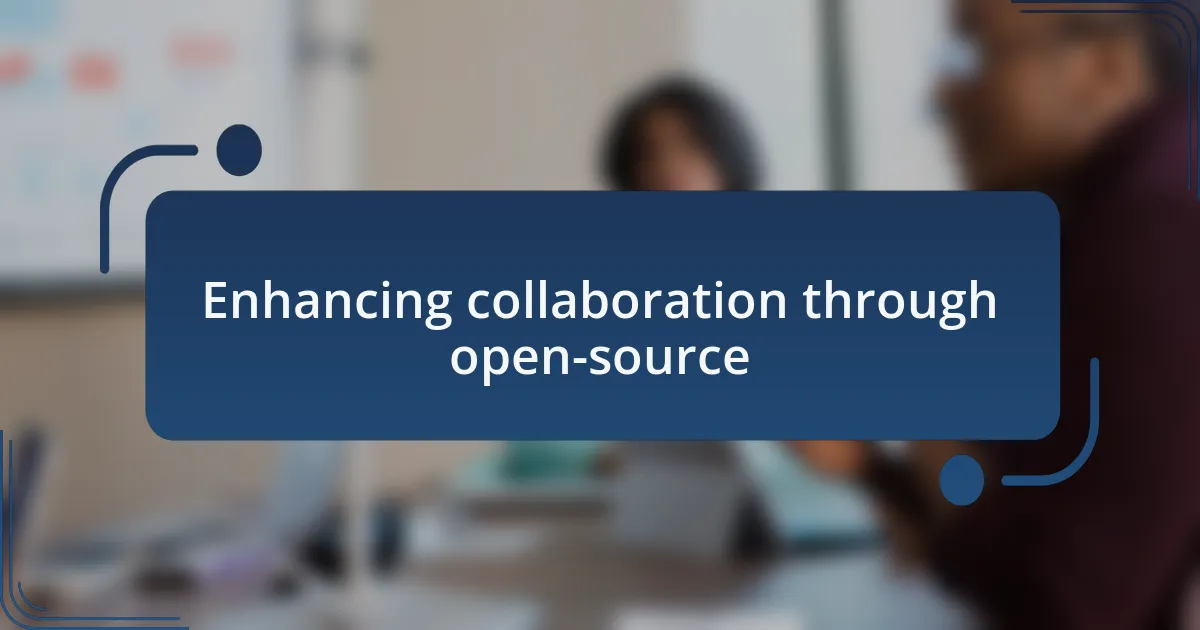
Enhancing collaboration through open-source
Enhancing collaboration is one of the most remarkable effects I’ve observed with open-source solutions. I recall a time when our team integrated a popular open-source communication tool that allowed for real-time collaboration. Suddenly, team members felt more connected, regardless of where they were working. Have you ever experienced that thrilling rush when ideas spark in an instant? It reinforced how sharing a common platform can create a unified vision, driving everyone to work towards the same goal.
Another aspect that stands out to me is the transparency in open-source projects. With access to the underlying code, our team fostered an atmosphere of trust and openness, where every contribution was valued. I vividly remember a brainstorming session that emerged from tweaking a shared project—a teammate’s input turned a simple feature into something innovative. Doesn’t it feel rewarding when everyone’s voice can shape the direction of a project?
Utilizing open-source frameworks has also transformed our approach to feedback and iteration. Instead of waiting for formal reviews, we could swiftly implement changes based on real-time suggestions from our collaborators. I think back to how our workflow changed when we adopted a feature that encouraged commenting directly within the codebase; it felt natural and efficient. Have you ever wished for that level of responsiveness in your projects? It’s empowering to see how open-source solutions can create an ecosystem where collaboration feels seamless and dynamic.
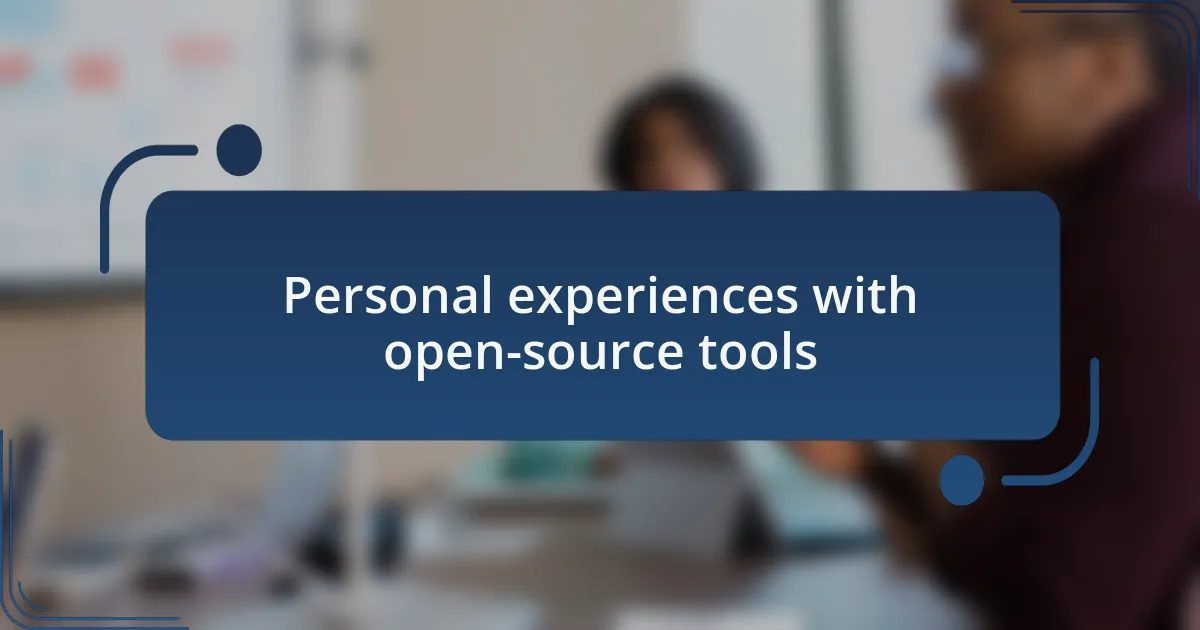
Personal experiences with open-source tools
I remember the first time I dived into using an open-source project for a communication framework at a previous job. It was a bit daunting at first, but once I got the hang of it, I felt an exhilarating sense of ownership and freedom. Have you ever felt that surge of creativity when you realize you can modify something to fit your needs perfectly? That experience taught me the importance of adaptability in our work.
One open-source tool I experimented with allowed my team to customize features that suited our workflows. I’ll never forget how exhilarating it was to propose a specific functionality that others had wished for but never voiced. When we implemented that change, not only did our productivity jump, but it also fostered an environment where everyone felt encouraged to contribute ideas. Isn’t it amazing how openness can ignite passion in team members?
I’ve also had my share of challenges while navigating open-source solutions. There was a time when we faced compatibility issues with a third-party integration, and I was initially frustrated. However, as I scoured the community forums, I found fellow users who had faced similar hurdles and were eager to help. The camaraderie within that community transformed my frustration into a shared journey of problem-solving. Have you ever sought help from a vibrant community, only to realize how interconnected we all are? It reminded me that with open-source, we’re not just using a tool—we’re part of a larger movement.
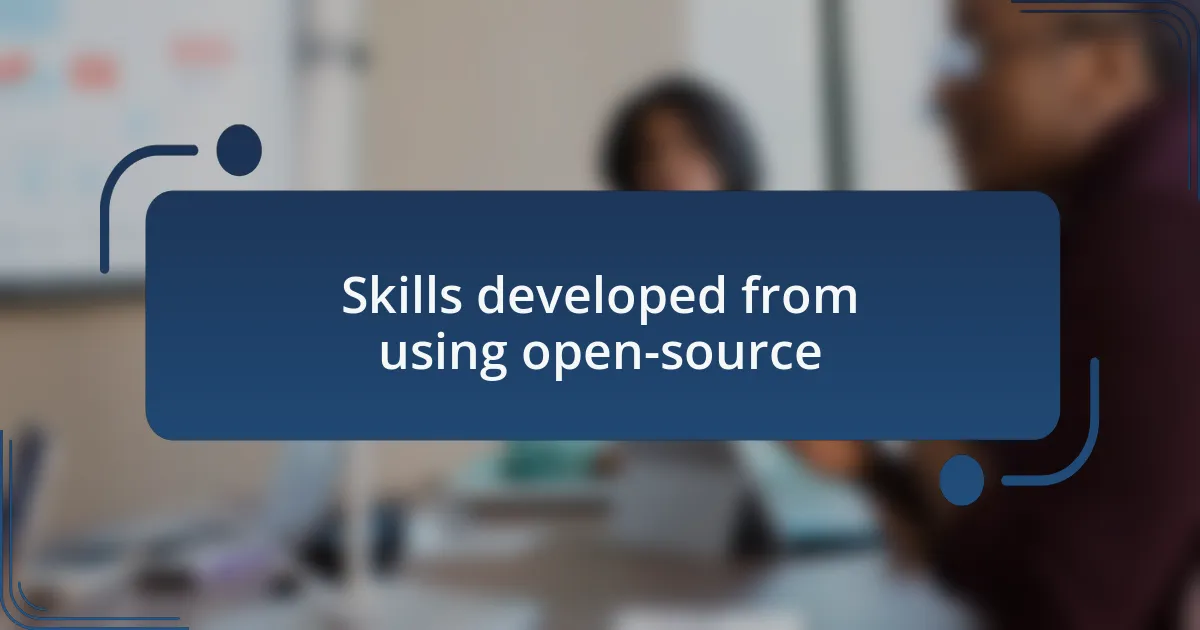
Skills developed from using open-source
In my journey with open-source solutions, I found myself developing a robust problem-solving mindset. One particular moment stands out: after countless hours troubleshooting a code snippet that just wouldn’t work, I finally found the solution buried in a comment from another user. It struck me how essential it is to be persistent. Have you ever felt that satisfaction when a complex problem finally clicks into place? That’s a skill I carry with me everywhere.
Collaboration became another invaluable skill as I engaged with diverse contributors from around the globe. I distinctly remember a late-night brainstorming session on GitHub, where someone from a different time zone brought in fresh ideas that sparked new possibilities for our project. Isn’t it fascinating how the synergy among people with different perspectives can elevate a project? This experience helped me appreciate the power of teamwork, even when it’s virtual.
On top of that, I’ve sharpened my technical skills significantly. Initially, I was merely a user of the tools, but as I contributed code, I started to understand the underlying architecture. While debugging a complex integration with an API, I experienced a lightbulb moment. Have you ever had a realization that deepened your understanding of a tool you thought you already knew? This exploration not only expanded my technical knowledge but also increased my confidence in tackling complex projects head-on.
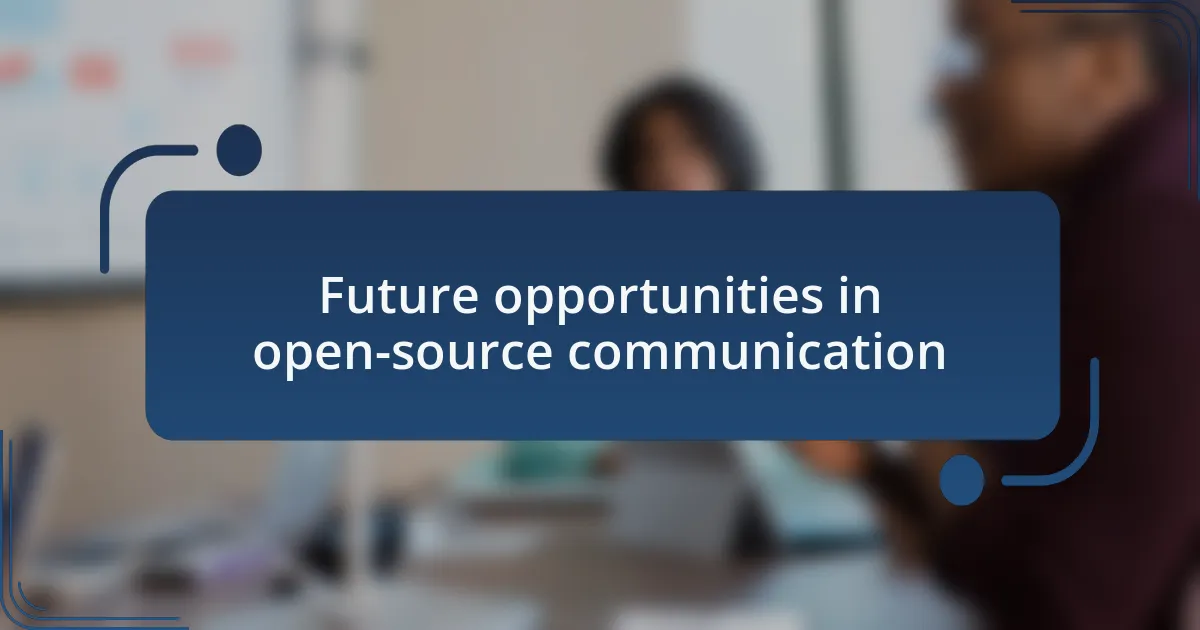
Future opportunities in open-source communication
Future opportunities in open-source communication are vast and exciting. I can’t help but imagine the possibility of crowd-sourced language translation tools, which could bring us closer in our interactions. I once used a community-driven translation tool that significantly improved my ability to connect with non-English speakers. Isn’t it incredible how open-source solutions can break down those language barriers, fostering global collaboration?
As I look forward, one of the most intriguing aspects is the integration of AI with open-source communication platforms. I recently participated in a project that utilized AI for enhancing user engagement through personalized interactions. That experience made me realize how AI can be harnessed to improve accessibility and inclusivity. Have you ever wondered how much smarter and intuitive our communication tools could become in the near future?
Moreover, I see a bright future where open-source communication fosters innovation in data privacy and security. Reflecting on my own experiences, I’ve often worried about data breaches in proprietary systems. Contributing to open-source projects focused on encryption taught me how powerful community-driven initiatives can be in protecting user data. That’s a liberating thought, isn’t it? The chance to shape a more secure digital landscape feels incredibly empowering.